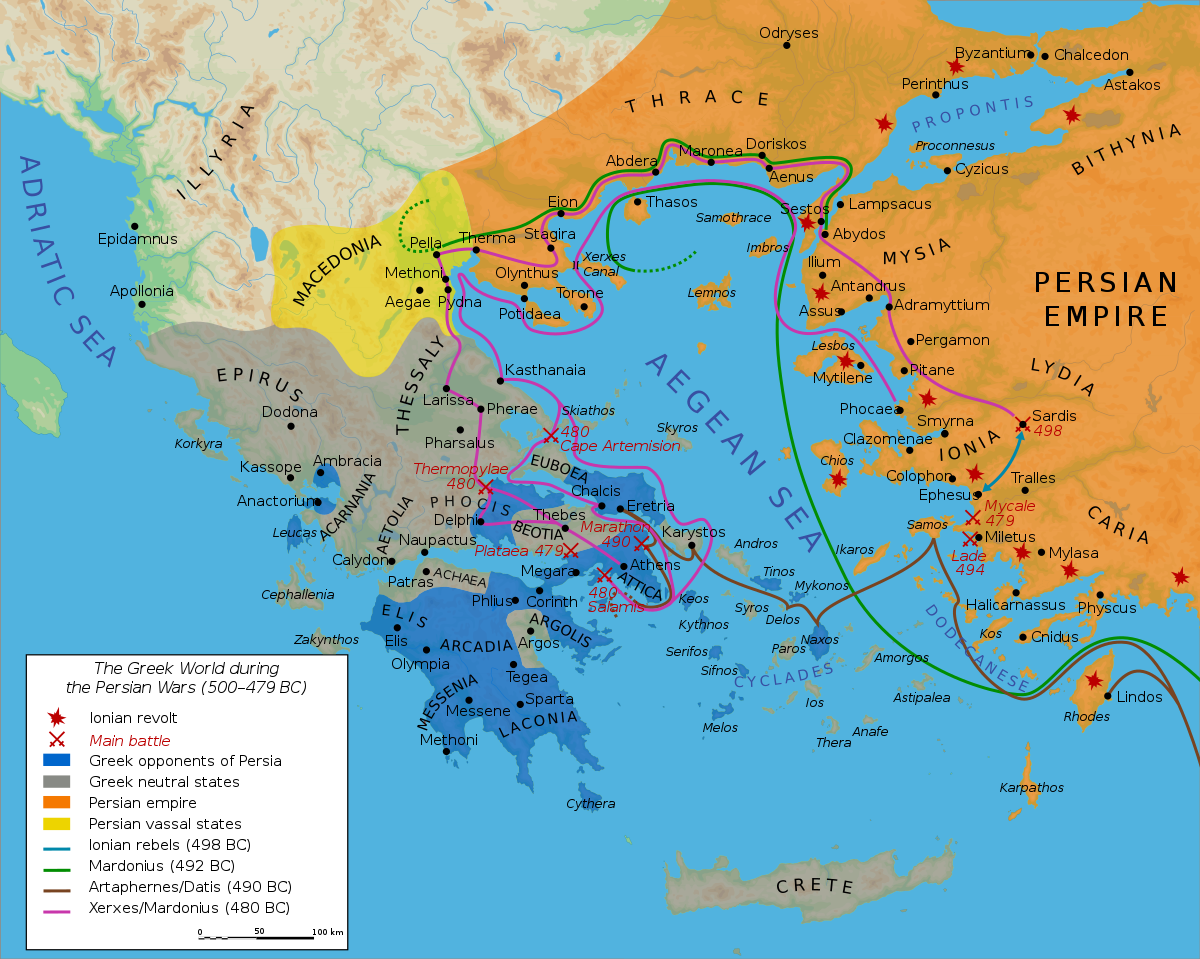Darius now planned a much greater invasion, but an Egyptian uprising and then his death prevented it. His successor, Xerxes (r. 486-465), having subdued the Egyptians, resumed the elaborate preparations for war in 481.
By the time Xerxes was ready to attack, Miltiades was dead. A leader of the nobles, he had been brought down by a rival faction. One means of keeping factionalism under control had been introduced by Cleisthenes and, about 487, was revived: ostracism. The word comes from ostrakon, a fragment of a clay pot on which citizens scratched the name of any politician they wished to exile from the city for ten years. Apparently a majority of a meeting of 6,000 citizens (3,001 votes) was needed to ostracize. The 480s the decade of preparation for Xerxes’ expected attacks-was a period of frequent ostracism. In the process a leader named Themistocles emerged as the popular choice to lead the resistance to the anticipated Persian invasion.
When new supplies of silver were discovered in 483, Themistocles persuaded the Athenians to use the money to build a new fleet instead of passing it out among the citizens. This decision probably determined the outcome of the Persians’ new effort and incidentally suited the poor, who built and rowed the ships and whose fortunes were associated with the navy. As the leading military power of Greece, Sparta took over the leadership of the anti-Persian Greek poleis, which together formed an anti-Persian league with a congress of delegates from the individual cities and a unified command. Knowing that its forces would be greatly outnumbered, the league abandoned the northern cities, where the wide plains allowed the Persian calvary to operate freely.
In 480 B.C. Xerxes’ huge army, its supply lines great¬ly overextended and its speed slowed down by its num¬bers, crossed into Europe and swung south into Greece, while a fleet sailed along the coast. At the pass of Thermopylae in central Greece, a Greek traitor showed the Persians how to outflank the defenders, but a small army, primarily of three hundred Spartans, defended the pass to the last man. A storm, a battle, and a second storm cut the Persian fleet in half. The historian Herodotus (c. 490- 425 B.C.) tells us that the Delphic oracle had prophesied that Athens would be destroyed and had advised the Athenians to put their trust in their “wooden walls.” Themistocles persuaded the Athenians that the message meant they should abandon the city to its patron goddess Athena and rely upon their wooden ships for their defense.
Athens was accordingly evacuated, except for the defenders of the Acropolis, whom Xerxes’ men killed as they burned the city. In the narrow waters of the Strait of Salamis, near Athens, the Greek fleet awaited the Persian attack, for an engagement in the open sea would favor the larger Persian fleet. Themistocles sent a misleading message to the Persians pretending that he would betray the Greeks, and so convinced them that it was safe to attack. The Greek fleet won a smashing victory. Xerxes had to withdraw from Greece; in 479 at Plataea united Greek forces numbering more than a hundred thousand men defeated the Persian troops once again.
Although the maintenance of Greek unity was precarious because of thousands of personal and municipal rivalries among the Greeks, members of the league had kept the oath, “I shall fight to the death, I shall put freedom before life, I shall not desert colonel or captain alive or dead, I shall carry out the generals’ commands, and I shall bury my comrades-in-arms where they fall and leave none unburied.” An intensely individualistic people had shown, for a time at least, that they could put the general interest ahead of all else. Soon afterward at Mycale (478 B.C.) the Greeks scored another victory on land and sea. The Persians had been stopped, although peace was not formally made until 449 and many times during those three decades the Greeks were threatened with renewed invasion.

